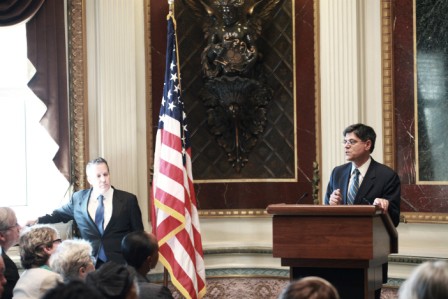Court Ruling Means Seniors Can Keep New Medicare Benefits
Seniors have plenty to celebrate today as the Supreme Court has upheld health care reform and all the benefits it brings to Americans in Medicare.
“Health care reform is vital for the economic health of our nation and the Medicare and Medicaid programs. Today’s decision helps move our nation forward while also protecting America’s elderly, poor, sick, and uninsured by preserving billions of dollars in benefits and countless provisions to cut waste, fraud and abuse that extend these programs’ solvency.” Max Richtman, NCPSSM President/CEO
“The Supreme Court’s decision is the most important safety net related decision since the Social Security Act was upheld by the Court in 1937. It validates Congress’ clear intent to improve seniors’ health and well-being and uphold all of the provisions important to all older adults.” Paul Nathanson, National Senior Citizens Law Center Executive Director
 Virtually every American family will be touched by today’s ruling but here’s a reminder of just some of the benefits this ruling preserves for America’s elderly :
Virtually every American family will be touched by today’s ruling but here’s a reminder of just some of the benefits this ruling preserves for America’s elderly :
· Seniors will continue to receive prescription drug savings through brand name and generic discounts
· The Part D prescription drug coverage gap known as the ‘donut hole’ will continue to be phased out
· Covered annual wellness visits for beneficiaries will continue to be provided in Medicare
· Seniors will pay less for preventive services. Under the ACA, Medicare will fully cover screenings like mammograms, pap smears, bone mass measurements, depression screening, diabetes screening, HIV screening and obesity screenings
· 8 years has been added to Medicare’s solvency thanks to the Affordable Care Act
Unfortunately, the future of an estimated 3.3 million uninsured young seniors, ages 50-64, who would have received health coverage under Medicaid and many of the 16 million older adults and individuals with disabilities who rely on Medicaid for long-term services and supports, is less certain with this ruling as the Court has limited the government’s ability to penalize states who do not participate in the expansion of Medicaid. That means some states could limit their expansion to seniors. We’ll have more details on what the Medicaid ruling really means for seniors nationwide.
Message Delivered – Don’t Cut Social Security & Medicare
About 100 senior


In addition to the White House Q & A five seniors were also given the opportunity to tell their personal stories. Their words provide some real-life context to a Washington debate that all-too-often focuses on balance sheets and let’s make a deal 


“I lived on the edge of financial disaster for a long time just because my husband needed long-term care. Social Security and Medicare were the lifelines I needed to come through that very difficult time. They are lifelines future generations will also need and they should be protected and strengthened – not cut or privatized”
Margaret Metzler, from San Jose, is among the millions of America seniors who want to work but can’t find a job. She says she’s found herself too old to be marketable in this economy yet too young to qualify for Social Security. She told the White House:
“That’s why I’m so tired of politicians in Washington saying with great conviction that we should all be working longer as if just “saying it” will create jobs for seniors, incentivize employers to hire or retain older workers, and create an American economy ready to handle millions of older workers like me who would need to stay on the job until 69 or 70 to get their full benefits, if the retirement age is raised. Not to mention, what will this mean to our younger workers if generations of older workers have to remain in their jobs longer?”
Retired Nash


“I am a typical American retiree. I’m not rich or living high on the hog – I’m not looking for benefits for myself at the expense of my children and grandchildren. In fact, because I care about their futures I won’t sit idly by and watch American’s most successful anti-poverty programs be dismantled through benefit cuts or privatization.”
As one participant said about today’s White House meeting, ” I think we got through to them”. Now these seniors will bring that message home to their communities and to the candidates running for office nationwide.
Seniors Tell Washington — Don’t Cut Social Security & Medicare Benefits
More than 1


Tomorrow the group will attend the White House Senior Community Leaders Summit on Tuesday, June 26th. We here at the National Committee to Preserve Social Security and Medicare sponsored this summit to provide a unique opportunity for participants to share directly with the Administration their personal experiences with and outlook on the Affordable Care Act, Social Security, Medicare, and Medicaid. The summit will include policy briefings, panel discussions, and a question and answer session on proposals that would impact these vital federal programs which touch the lives of virtually every American family. The message from America’s seniors today has been clear… Washington should not cut Social Security and Medicare benefits to pay for fiscal failures these programs did not create.
Think the Supreme Court Ruling Won’t Impact You? Think Again…



- Prior to the ACA, Medicare beneficiaries were required to pay a deductible and 20% co-pay for many preventive health services.
- The ACA eliminated cost-sharing for many preventive services and introduced an annual wellness visit for beneficiaries.
- The ACA also eliminated cost-sharing for screening services, like mammograms, Pap smears, bone mass measurements, depression screening, diabetes screening, HIV screening and obesity screenings.
Savings for Chemotherapy and Dialysis patients in Medicare Advantage plans lost
- In the past, Medicare Advantage plans have had flexibility to impose cost-sharing structures that differ from traditional Medicare. Prior to the ACA, plans increased co-insurance for some services, like chemotherapy and dialysis. Beneficiaries who were enrolled in MA plans that needed those services were left worse off than if they had the same conditions and were in traditional Medicare. Many beneficiaries enrolled in these plans did not understand the differences in cost sharing.
- The ACA attempts to remedy this by preventing Medicare Advantage plans from imposing higher cost-sharing for chemotherapy and dialysis than is permitted under Medicare Parts A and B.
- The Centers for Medicare and Medicaid Services (CMS) issued final regulations on these improvements in 2011, and many became effective January 1 of this year.
Improvements in care for individuals with chronic conditions gone
- The ACA has several provisions targeted to improving the quality of care for patients with chronic illness and reducing the costs to Medicare and Medicaid for serving those beneficiaries.
Improvements to help seniors transition from the hospital back home repealed
- The ACA established the Community-Based Care Transition Program which targets individuals who are in traditional fee-for-service Medicare and are hospitalized and at risk for readmission. The program provides grants to hospitals to work with community-based organizations to provide transitional care interventions.
- 30 community-based organizations across the country have already partnered with local hospital systems and are committed to reducing readmissions by 20% and hospital acquired conditions by 40%.
Improvements in seniors’ access to primary care physicians lost
- Through the Independence at Home demonstration, that ACA will pay physicians and nurse practitioners to provide home-based primary care to targeted chronically ill individuals for a three-year period.
- CMS recently launched this primary care initiative with 16 practices across the country.
Medicare’s Trust Fund will face insolvency 8 years (or even more) sooner than expected
- The Affordable Care Act includes many measures to control costs as well as models for reform that will increase the solvency of the Medicare. If the ACA is repealed those cost saving measures will be lost and Medicare’s solvency threatened.
The National Committee has partnered with the highly respected National Senior Citizens Law Center to provide detailed analysis of the various Affordable Care Act rulings that could come from the Supreme Court. Our full analysis will be available immediately following the Court’s ruling, expected soon.
Rather Than Slashing Social Security How About Lifting the Cap?
The Center for Economic and Policy Research has released a new report looking at the effect of raising or lifting the payroll tax cap on Social Security contributions.Incredibly, most people still don?t realize that workers who earn more than $110,100 don?t contribute on their full income and that simply removing that tax loophole for high earners would close the vast majority of Social Security?s modest long-term funding gap. Legislation introduced by Senator Bernie Sanders (I-VT) and Rep. Peter DeFazio (D-OR) would apply the same payroll tax already paid by more than 9 out of 10 Americans to those with incomes over $250,000 a year. Making the wealthiest Americans pay the same payroll tax already assessed on those with lower incomes should be a no-brainer and it is the solution Americans prefer rather than cutting already modest Social Security benefits.Lifting the cap also recaptures income lost to Social Security because of the growing income inequality in this nation that has allowed a growing number of wealthy Americans to avoid paying their fair share. Robert Reich describes how:
Back in 1983, the ceiling was set so the Social Security payroll tax would hit 90 percent of all wages covered by Social Security. That 90 percent figure was built into the Greenspan Commission’s fixes. The Commission assumed that, as the ceiling rose with inflation, the Social Security payroll tax would continue to hit 90 percent of total income.Today, though, the Social Security payroll tax hits only about 84 percent of total income. It went from 90 percent to 84 percent because a larger and larger portion of total income has gone to the top. In 1983, the richest 1 percent of Americans got 11.6 percent of total income. Today the top 1 percent takes in more than 20 percent.If we want to go back to 90 percent, the ceiling on income subject to the Social Security tax would need to be raised to $180,000. Presto. Social Security’s long-term (beyond 26 years from now) problem would be solved.
Unfortunately, rather than embrace lifting the payroll tax cap, many Republicans and Democrats alike now seem to be rallying behind the Bowles-Simpson (BS) plan, which proposes two-thirds benefit cuts over one-third income increases.Ask your member of Congress?does he/she support cutting benefits for middle-class Americans rather than restoring contributions by the wealthy to their historic levels?




